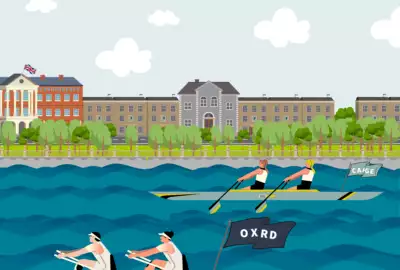Expert Insights
Oxbridge Interview Preparation Guide
Published 12th September 2025 by Alastair

If you're reading this, it probably means that you've been invited to an interview at Oxford or Cambridge. If that's the case, then congratulations! Being invited to an Oxbridge interview is a significant achievement. It means your application, academic record, and personal statement have impressed the admissions tutors.
However, receiving an invitation is only the beginning. The interview is designed to test how you think, how you respond to unfamiliar material, and how you engage with challenging academic discussion.
This guide explains what to expect, how to prepare effectively, and the strategies that can make the difference between a good interview and a great one. Whether you are applying to Oxford or Cambridge, these tips will help you feel confident and ready to perform at your best.
Before we begin, we invite you to join University Consultant Donald Bennet on October 28, 2025, from 6:00 to 6:30 PM for a live webinar. During the webinar, he will demystify Oxbridge interview formats through a real-time demonstration and share proven strategies for success. This session is ideal for Year 12–13 students and their parents preparing for Oxbridge applications. Sign up using the form below.
Now onto the guide...
With Donald Benett, October 28th, 2025, 6:00 – 6:30 PM

Oxbridge interviews are not like traditional job interviews or even standard university admissions interviews. Their purpose is to assess your intellectual potential, rather than to measure what you already know.
Interviewers want to see:
How you approach problems
Your ability to think logically and creatively
How you apply knowledge to new contexts
Evidence of genuine curiosity and enthusiasm for your subject
It is not about producing a perfect answer. Instead, tutors are interested in how you explain your reasoning, adapt when challenged, and build on new ideas.
While every candidate’s experience is slightly different, interviews share some common features:
Discussion-based format: A conversation about your subject with one or more tutors.
Unfamiliar material: You may be given an unseen text, graph, diagram, or problem to analyse.
Application references: Your personal statement and any submitted work can be used as prompts.
Multiple interviews: You may meet with more than one college to ensure fairness.
Remote or in-person: In recent years, many interviews have been conducted online, so preparation should cover both.
A Biology applicant might be shown a diagram of an unfamiliar organism and asked to interpret it.
An English applicant may be asked to analyse a poem they have never seen before.
A Physics candidate could be presented with a problem involving mechanics or motion and invited to reason through it step by step.

One of the best ways to prepare is to practise with genuine Oxbridge-style questions. These questions are deliberately challenging, often involving unfamiliar material or abstract scenarios. The key is not to jump straight to the “right” answer, but to demonstrate logical reasoning, creativity, and subject understanding.
Question: Why do leaves appear green?
Model Response:
“Leaves appear green because chlorophyll strongly absorbs light in the red and blue parts of the spectrum but reflects green wavelengths. This is linked to photosynthesis, since chlorophyll a and b are tuned to absorb light at wavelengths that provide maximum energy for driving electron excitation in the photosystems. Reflecting green is more of a by-product than an adaptive feature. It is interesting to note that some plants in shaded environments contain additional pigments, such as carotenoids, which extend their absorption spectrum.”
Question: Here is an unfamiliar poem. What strikes you about its use of language?
Model Response:
“One feature that stands out immediately is the use of enjambment, which creates a sense of movement and urgency. The imagery of decay contrasts with the steady rhythm, suggesting a tension between natural decline and human attempts to impose order. The alliteration of ‘fading fields’ amplifies this effect by linking sound and meaning. Even without knowing the poet’s context, the lexical choices suggest a preoccupation with time and transience.”
Question: Why do we have red blood cells rather than free haemoglobin circulating in the plasma?
Model Response:
“Free haemoglobin in plasma would be filtered rapidly by the kidneys, causing loss of the protein and potentially damaging the renal tubules. By packaging haemoglobin inside red blood cells, the body ensures it can circulate for around 120 days, greatly increasing oxygen transport efficiency. It also allows for additional functions, such as carbon dioxide transport and buffering of blood pH, through the presence of enzymes like carbonic anhydrase within the cell.”
Question: If a tree falls in a forest and no one is there to hear it, does it make a sound?
Model Response:
“That depends on how we define ‘sound’. If we define it as vibrations in the air, then yes, the tree makes a sound. But if we define it as the perception of those vibrations by a conscious observer, then no, it does not. The question, therefore, reveals a distinction between physical phenomena and human experience. Philosophers such as Berkeley would argue that without perception, reality cannot be said to exist in the same way. A realist, by contrast, would maintain that the vibrations occur regardless of observation.”
These model responses are not “perfect answers.” Instead, they illustrate the qualities Oxbridge tutors look for:
Breaking the problem into steps
Applying core subject knowledge
Exploring different perspectives
Communicating ideas clearly and logically
Practising with this style of question will make you more comfortable when faced with something unexpected in the interview.
Need help with your subject matter? Our Oxbridge Tutors can help through one-to-one coaching tailored to your subject.
Spend time with your personal statement and any submitted work. Tutors may quote specific lines back to you. Be prepared to expand on books, lectures, or experiences you referenced. It is far better to speak honestly about your genuine interests than to embellish details.
Reading widely is essential. Go beyond your syllabus by exploring:
Academic books and journals
Articles in reputable newspapers or subject magazines
Documentaries, podcasts, and lectures relevant to your field
This shows curiosity and ensures you have the breadth to discuss your subject from different angles.
One of the biggest adjustments is learning to explain your reasoning as you go. Even if you feel unsure, verbalising your thought process allows tutors to understand how you think. Phrases such as “I would begin by considering…” or “A possible approach might be…” keep the conversation moving.
Work through past Oxbridge interview questions or sample problems. Try these techniques:
Set a timer to practise working under pressure
Record yourself and listen back for clarity and pacing
Focus less on memorising answers and more on building logical structures
Mock interviews provide invaluable practice. Whether with a teacher, mentor, or professional tutor, the opportunity to be questioned by someone else helps you manage nerves and receive feedback.
💡 For a live demonstration, join our Oxbridge Interview Webinar on 28 October 2025 to see these strategies in action.
Nerves are normal, and tutors expect them. Some techniques include:
Taking a breath before answering
Pausing to think rather than rushing into a response
Focusing on the conversation rather than the outcome
| Preparation Area | Key Actions |
|---|---|
| Personal Statement & Written Work | Reviewed in detail and ready to discuss line by line |
| Subject Knowledge | Broadened beyond the school syllabus with wider reading |
| Practice Questions | Attempted under timed, realistic conditions |
| Mock Interviews | Completed with feedback from teachers, peers, or tutors |
| Nerves Management | Strategies in place such as pausing, breathing, and reframing |
| Logistics & Technology | Setup tested for online interviews; travel planned for in-person sessions |

Oxbridge interviews are challenging, but they are also an opportunity to experience the academic culture that makes Oxford and Cambridge unique. With thorough preparation, you can walk into your interview confident, curious, and ready to demonstrate your intellectual potential.
At Ivy Education, we specialise in guiding students through every stage of the process. From personalised Oxbridge tuition to full UK University Consultancy services, our team has the expertise to help you succeed.
Explore our Oxbridge Tuition for one-to-one coaching tailored to your subject.
Learn more about our UK University Consultancy for comprehensive support across applications and interviews.
No. The interview is not a test of memorisation. Tutors want to see how you think, not whether you already know all the answers. Showing clear reasoning and curiosity is more important than factual recall.
Most applicants have two to four interviews, sometimes at different colleges. This ensures fairness and gives more than one academic team the chance to assess you.
Yes, it is very likely. Be prepared to discuss any book, idea, or experience you mentioned. If you cannot back up what you wrote, it may undermine your credibility.
That is normal. Tutors expect you to encounter unfamiliar material. Talk through your reasoning step by step — even partial or speculative answers can still impress.
The style is similar across both universities. You may notice small differences between colleges and subjects, but the core aim — to test your thinking skills — is the same.
Everyone gets nervous. Tutors take this into account, and they expect pauses for thinking. Being nervous does not disadvantage you, provided you can still communicate your reasoning.












